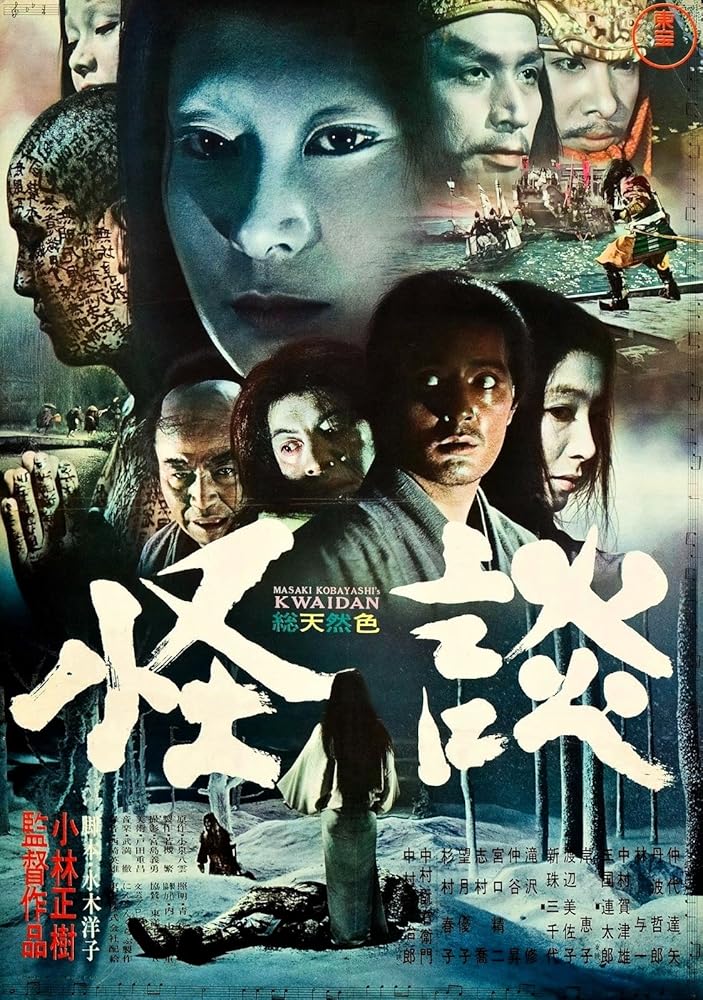
KWAIDAN
(director: Masaki Kobayashi; screenwriters: Yobo Mizuki/based on the short stories by Lafcaido Hearn; cinematographer: Yoshio Miyajima; editor: Hisashi Sagara; music: Toru Takemitsu; cast: Black Hair: Rentaro Mikuni (Samurai), Michiyo Aratama (First Wife), Misako Watanabe (Second Wife). “The Woman in the Snow”: Tatsuya Nakadai (Minokichi), Keiko Kishi (Oyuki). Hoichi the Earless: Katsuo Nakamura (Hoichi), Rentaro Shimura (Priest), Joichi Hayashi (Yoshitsune). In a Cup of Tea: Ganemon Nakamura (Lord Nakgawa), Noboru Nakaya (Shikibu Heinai); Runtime: 164; MPAA Rating: NR; producer: Shigeru Wakatsuki; Criterion Collection; 1964-Japan-in Japanese with English subtitles)
“A colorfully exotic offering but lacks the visceral power to explore the horror genre.”
Reviewed by Dennis Schwartz
The title translates to ghost story in Japanese. It’s written by Yobo Mizuki and is based on the short stories by Lafcaido Hearn, an American who settled in Japan in 1890 and later became a Japanese citizen. Masaki Kobayashi (“Tokyo Trial”/”The Empty Table”/”Hymn to a Tired Man”) directs four short supernatural stories (Black Hair, Hoichi the Earless, In a Cup of Tea and The Woman of the Snow ) that all involve an encounter with a ghost. It’s presented in a highly stylized and intellectual manner, that serves up a colorfully exotic offering but lacks the visceral power to explore the horror genre. What’s breathtakingly brilliant is the art direction by Shigemasa Toda, that makes this one a visual treat. The film’s plusses are its strong imagery, haunting atmosphere and some memorably striking spooky moments. The best story is titled “Hoichi the Earless” and tells about a blind biwa player (Katsuo Nakamura) called by the spirits to recite his tale of the doomed Heike clan’s defeat by their rival Taira clan to a samurai ghost. Hoichi was protected by a monk who painted protective symbols all over his body, but the monk missed his ears. Those get torn apart by the emotionally bent out of shape spirits.
“Black Hair” is the tale of a samurai (Rentaro Mikuni) who returns to the wife he deserted for a selfish, wealthy woman some time ago and, after sleeping with the neglected woman, discovers her skeletal remains in his bed and goes raving mad.
“The Woman of the Snow” is a story cut from the theatrical releases abroad but was restored when the film was released on DVD. A young apprentice woodcutter (Tatsuya Nakadai) is saved from death by a mysterious snow maiden who vows to kill him should he ever blab about what went down, as she kills his woodcutter boss with her breath.
“In a Cup of Tea” A guard (Ganemon Nakamura) sees a samurai’s face in his teacup and absorbs the ghost’s soul into his body after drinking the tea.
In a 1972 interview with scholar Joan Mellen, Kobayashi heatedly dismissed the characterization of Kwaidan as a horror film: “My main intention was to explore the juxtaposition between man’s material nature and his spiritual nature, the realm of dream and aspiration. I wanted to create a drama which dealt directly with the spiritual importance of our lives. I also enjoyed conveying the sheer beauty of traditional Japan.”
The film took five years to make and was the most expensive Japanese film to date. It won the Jury Prize at Cannes in 1965.
REVIEWED ON 10/31/2008 GRADE: B